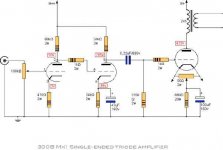I see a lot of single ended amps with an ungrounded secondary. To me it is an unnecessary and unsafe thing to do. Always ground the secondary.
Agree, grounding the secondary will eliminate the possibility of an innocent or the owner of said amplifier being electrocuted in the event of an insulation failure between the primary and secondary of the transformer.
It is sometimes the case that doing so will slightly degrade the HF response of the amplifier when there is significant interwinding capacitance and the tube rp is fairly high. (Not generally a problem at all in 300B amplifiers)
It is sometimes the case that doing so will slightly degrade the HF response of the amplifier when there is significant interwinding capacitance and the tube rp is fairly high. (Not generally a problem at all in 300B amplifiers)
It's perfectly safe. P = V2/R = 8 Therefore, V is at most 11.3 and that's when working into 16 Ω. Voltage lower and current higher, when working into smaller impedance loads.
Grounding a winding that's part of a NFB loop is necessary. However, that design is no NFB.
"Floating" speaker windings are advantageous, when "strapping" the 2 sections of a stereoblock into a monoblock. Connect the I/Ps in parallel and the speaker windings in series, "+" to "-". Please observe that, unlike the situation where a common ground is present, phase splitting before the I/Ps is not needed.
Grounding a winding that's part of a NFB loop is necessary. However, that design is no NFB.
"Floating" speaker windings are advantageous, when "strapping" the 2 sections of a stereoblock into a monoblock. Connect the I/Ps in parallel and the speaker windings in series, "+" to "-". Please observe that, unlike the situation where a common ground is present, phase splitting before the I/Ps is not needed.
HIPOT failure, winding to winding, is most unlikely. Definitely ground the core, for safety's sake. While designs without power transformers are currently an _absolute_ NO/NO, that was not always the case. Into the 1970s, some areas still had DC house current. The best equipment available for use in those zones used O/P "iron" with a "floating" speaker winding and a separate, grounded, NFB winding. Any I/P for an external component had to be signal transformer isolated. Keeping humans and their pets away from direct contact with the power mains has been and remains a very good idea.Agree, grounding the secondary will eliminate the possibility of an innocent or the owner of said amplifier being electrocuted in the event of an insulation failure between the primary and secondary of the transformer.
And yet not too many years ago I had an amplifier in for repair with exactly this problem, so perhaps given the small quantity of amps that pass through my hands it's not quite as rare as you might think. (Over the past 30 years I have seen at least 3 or 4 other amps with this failure mode including Fisher, and HH Scott integrated amps - in this case because the secondaries were grounded they blew the AC line fuse instead of potentially electrocuting someone.)<snip> HIPOT failure, winding to winding, is most unlikely. Definitely ground the core, for safety's sake.
There's really not a lot to discuss, grounding the secondary is smart for safety and advocating otherwise here is a violation of our rules.
Sorry I didn't mean to edit your post! Now fixed!
We don't care about the voltage _across_ the speaker, we worry about the voltage from speaker coil to ground - that's the one that will kill you.It's perfectly safe. P = V2/R = 8 Therefore, V is at most 11.3 and that's when working into 16 Ω. Voltage lower and current higher, when working into smaller impedance loads.
The question about grounding the secondary periodically gets "resurrected". The ungrounded secondary can possibly cause the surviving spouse syndrome.
Another safety measure that was mentioned above, is the grounding of the output transformer frame. I had a brand new output transformer that had a short from the primary to the frame. (B+ to frame, ouch!). I caught it before power-up. That is another example of . . . Safety First!
Another safety measure that was mentioned above, is the grounding of the output transformer frame. I had a brand new output transformer that had a short from the primary to the frame. (B+ to frame, ouch!). I caught it before power-up. That is another example of . . . Safety First!
So if you have physically separated windings for primary and secondary (double c-core &c) and the iron is properly grounded, and the power output is modest like for a 300b then no need to ground for safety? I understand that it remains good practice anyway and I intend to follow that practice since, from time to time, it is fun to be alive [emoji16]
All other considerations aside separating the primary and secondary as described is a great recipe for high leakage inductance and poor HF response.
primary to secondary shorts
I've seen two cases of a primary to secondary short: one in a Marantz 8B and one in a Western Electric 91A. Unfortunately both were very expensive to fix - so didn't get fixed. Ground the secondary.
- John Atwood
I've seen two cases of a primary to secondary short: one in a Marantz 8B and one in a Western Electric 91A. Unfortunately both were very expensive to fix - so didn't get fixed. Ground the secondary.
- John Atwood
- Home
- Amplifiers
- Tubes / Valves
- Walton 300b
